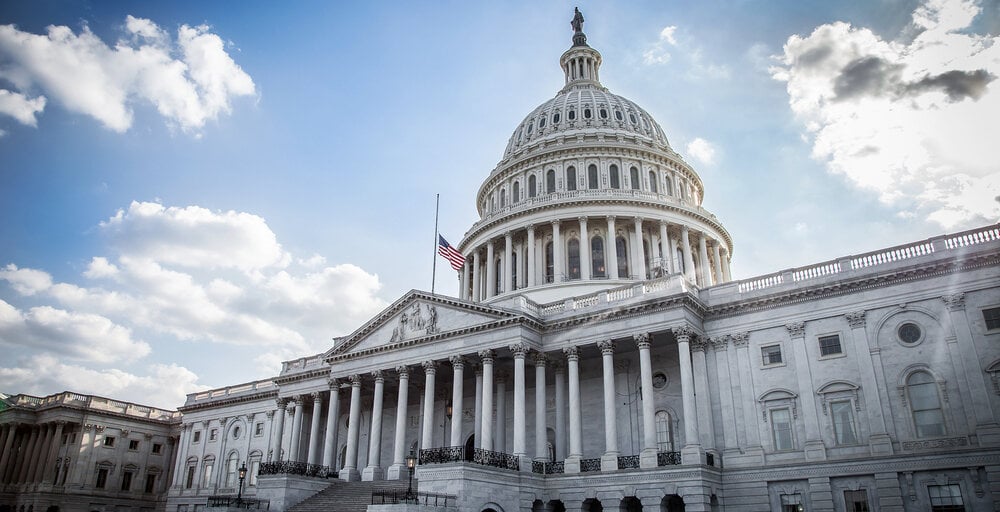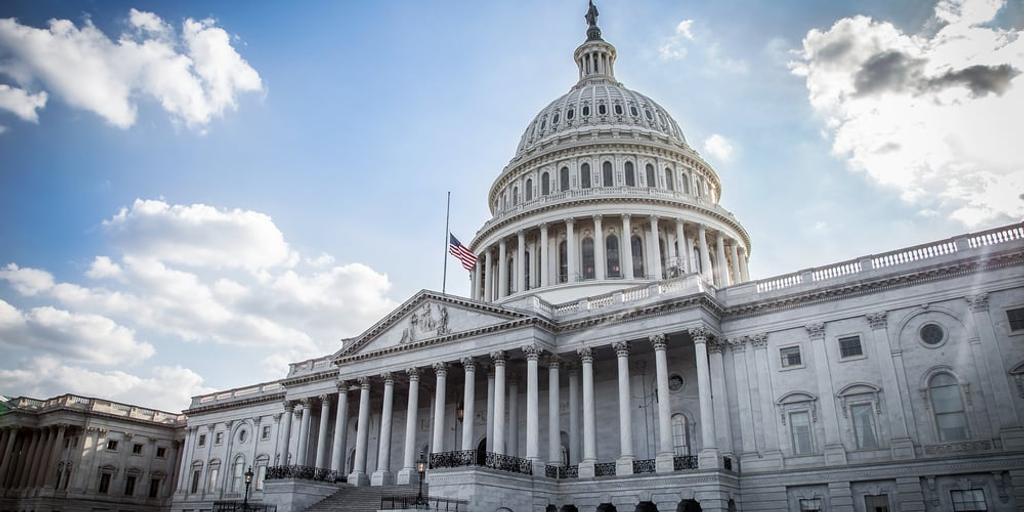Law and Order
Coinbase CLO to Address ‘Operation Chokepoint 2.0’ in Congressional Hearing
Published
2 months agoon
By
admin

Coinbase’s Chief Legal Officer, Paul Grewal, will testify before the U.S. Congress this week as lawmakers investigate allegations that federal regulators deliberately pressured banks to cut off financial services to crypto companies.
“I’m testifying at the @FinancialCmte’s oversight hearing looking into the past clandestine and undemocratic campaign to cut off crypto from banking,” Grewal said in a post on X. “On behalf of Coinbase, I’m proud to help shed light on the unfair treatment of our industry.”
The “Operation Choke Point 2.0: The Biden Administration’s Efforts to Put Crypto in the Crosshairs” hearing comes amid industry clamoring that U.S. financial regulators, including the Federal Deposit Insurance Corporation (FDIC), engaged in an unofficial campaign—to limit crypto’s access to banking.
With the U.S.’s stance on digital assets shifting under President Donald Trump’s administration, the outcome of these hearings could shape the future of crypto’s role in the U.S. financial system.
Grewal will testify alongside MARA Holdings CEO Fred Thiel, WSPN CEO Austin Campbell, and Anchorage Digital CEO Nathan McCauley in front of the Subcommittee on Oversight and Investigations of the Committee on Financial Services.
Lawmakers will also hear from financial and legal experts, including Stephen Gannon of Davis Wright Tremaine LLP and Mike Ring of Old Glory Bank. More witnesses may still be added to the list.
The issue gained renewed attention in November when venture capitalist Marc Andreessen claimed on Joe Rogan’s podcast that over 30 tech founders, many in crypto, had their bank accounts suddenly closed during former President Joe Biden’s presidency.
Then last month, House Oversight Committee Chair Rep. James Comer (R-KY) launched a formal investigation into the alleged financial blacklisting of crypto companies under the Biden administration, amid the rising tension between crypto companies and regulators.
“The Committee… is investigating improper debanking of individuals and entities based on political viewpoints or involvement in certain industries such as cryptocurrency and blockchain,” Comer wrote in the letter sent to crypto leaders.
Unredacted documents obtained by Coinbase suggest that the FDIC directed banks to limit their exposure to digital asset firms, raising concerns about potential regulatory overreach.
Crypto leaders argue this was a government-led effort to stifle the industry, similar to the original “Operation Chokepoint” under the Obama administration, which targeted industries deemed high-risk, such as gun sellers and payday lenders.
The previous Biden administration has denied any coordinated effort to block crypto firms from banking access.
While regulatory officials, such as former SEC Chair Gary Gensler, have denied the existence of an orchestrated effort, the evidence suggests otherwise.
The official hearing, scheduled for February 6, will be conducted separately by both the Senate Banking Committee and the House Financial Services Committee.
The FDIC did not immediately respond to Decrypt’s request for comment.
Edited by Sebastian Sinclair
Daily Debrief Newsletter
Start every day with the top news stories right now, plus original features, a podcast, videos and more.
Source link
You may like


$90K Breakout Ahead as BTC Decouples from US stocks after China’s Tariffs


Toncoin Takes A Hit With 12% Correction After Failing To Break $4.34, More Pain?


Bitcoin sentiment falls to 2023 low, but ‘risk on’ environment may emerge to spark BTC price rally


Crypto Trader Says Dogecoin Is at a Critical ‘Make-or-Break’ Level, Updates Outlook on Solana and Avalanche


Bitcoin Covenants: CHECKSIGFROMSTACK (BIP 348)


Illinois State Senator’s Bill Seeks to Claw Back $163 Million Lost to Crypto Fraud
Law and Order
Illinois to End Lawsuit Against Coinbase Over Staking Program: Report
Published
14 hours agoon
April 4, 2025By
admin

Illinois will put a pin in its lawsuit against Coinbase over the exchange’s staking services, a spokesperson for Secretary of State, Alexi Giannoulias, said Thursday.
“The office intends to drop the Coinbase lawsuit,” Giannoulias’ spokesperson told crypto media outlet CoinDesk. No timeline for the dismissal was provided.
The decision makes Illinois the fourth state to abandon litigation over the past month.
Vermont was the first state to dismiss its lawsuit on March 13, followed by South Carolina on March 27, with Kentucky filing on March 31.
The state-level retreats follow the Securities and Exchange Commission’s February decision to drop its own federal lawsuit against Coinbase, signaling a broader regulatory shift in crypto oversight under the Trump administration.
All ten state lawsuits were filed in June 2023 and were primarily based on the SEC lawsuit, which alleged Coinbase violated securities laws through its staking program that allowed crypto holders to earn rewards by locking up digital assets.
Regulators claimed these services constituted unregistered securities offerings. The ten states followed.
Illinois’ withdrawal is particularly critical as the state simultaneously advances a Bitcoin strategic reserve bill, proposing to create a dedicated fund to hold Bitcoin as a financial asset for at least five years.
Four down, six to go
So far, six states have not made any changes or taken any action to withdraw their lawsuits against the exchange: Alabama, California, Maryland, New Jersey, Washington, and Wisconsin.
Officials from New Jersey and Washington confirmed their cases remain active, according to the initial report. Meanwhile, the four other remaining states have made no public statement on pending litigation.
Decrypt has reached out to the states of Alabama, California, Maryland, and Wisconsin to confirm.
Coinbase has consistently claimed to advocate for clearer federal regulation rather than state-by-state enforcement.
Following earlier dismissals, Coinbase Chief Legal Officer Paul Grewal urged Congress to “end this litigation-driven, state-by-state approach with a federal market structure law.”
Edited by Sebastian Sinclair
Daily Debrief Newsletter
Start every day with the top news stories right now, plus original features, a podcast, videos and more.
Source link
Law and Order
Crypto Market Maker Hit With $428,000 Fine Over Wash Trading
Published
1 day agoon
April 3, 2025By
admin

A financial services firm has been fined over $400,000 after pleading guilty to wash trading in a Boston court.
CLS Global, a firm that specializes in market making, was ordered to pay a total of $428,059 to the government, in the form of seized cryptocurrency and fines.
The company was also sentenced to three years’ probation, during which time it will not be able to participate in U.S. cryptocurrency markets.
These charges followed an undercover law enforcement operation which specifically targeted sham trading, wash trading and activity intended to attract investors.
The company agreed to provide services for NexFundAI, an apparent cryptocurrency firm and Ethereum-based token traded on decentralized exchange Uniswap. In fact, the token and company were both created by the FBI as part of a sting operation targeting wash trading.
CLS Global’s actions
CLS Global, with a staff of 50 employed individuals, is based in the United Arab Emirates but works with cryptocurrencies available to investors inside the United States.
The company pleaded guilty to one count of conspiracy to commit market manipulation and wire fraud and one count of wire fraud in January 2025. In a statement, the U.S. Attorney’s Office for the District of Massachusetts noted that a remaining defendant in the case is presumed innocent “unless and until proven guilty beyond a reasonable doubt in a court of law.”
In a series of videoconferences, an employee of the firm revealed that the firm employed an algorithm that, “basically does self-trades,” making cryptocurrency trades from multiple wallets in an effort to mimic “organic buying and selling.”
The employee went on to say, “I know that it’s wash trading and I know people might not be happy about it.”
Daily Debrief Newsletter
Start every day with the top news stories right now, plus original features, a podcast, videos and more.
Source link
Law and Order
Stablecoin Transparency Bill Passes House Committee With Overwhelming Vote
Published
2 days agoon
April 3, 2025By
admin

The House Financial Services Committee voted to advance stablecoin legislation Wednesday, approving the STABLE Act with 32 members in favor and 17 opposed.
The bill, formally named the Stablecoin Transparency and Accountability for a Better Ledger Economy Act, would create a framework for dollar-denominated stablecoins, including reserve requirements and anti-money laundering standards.
During the markup session’s opening remarks, House Financial Services Committee Chair French Hill stressed how blockchain technology “continues to transform the way money moves.”
Hill stated that the bill forms part of their “ongoing efforts” to promote “financial innovation through sound digital asset policy. “
The vote proceeded despite controversy over President Donald Trump’s family’s connections to crypto ventures, including their foray into stablecoins with USD1 through World Liberty Financial.
Early in the session, Democrats raised concerns about potential conflicts of interest, suggesting amendments to prevent the president and cabinet members from offering stablecoin products while in office.
Those concerns connect with an earlier statement by Rep. French Hill from Monday that Trump’s crypto dealings have made drafting stablecoin legislation “more complicated.”
The legislation now faces two more hurdles before becoming law. After the markup, it will be reported out of committee and scheduled for consideration by the House of Representatives.
Both the House and Senate must align their approaches, with key differences in state versus federal regulation and the treatment of foreign issuers such as Tether.
The GENIUS Act, a separate version from the Senate, will be considered alongside it.
Once the STABLE bill passes the House, it will move to the Senate, where it will undergo a similar process of committee consideration before potentially reaching the Senate floor for a vote.
If both chambers approve the bill, any differences between the House and Senate versions would need to be reconciled before the final legislation could be sent to the President for signature or veto.
Wednesday’s development marks the committee’s second attempt to advance stablecoin legislation. A previous effort in 2023 stalled amid partisan disagreements under the Biden administration.
Edited by Sebastian Sinclair
Daily Debrief Newsletter
Start every day with the top news stories right now, plus original features, a podcast, videos and more.
Source link
Circle’s IPO Filing Tests Crypto Market Confidence After Trump’s Tariff Shock

$90K Breakout Ahead as BTC Decouples from US stocks after China’s Tariffs

Toncoin Takes A Hit With 12% Correction After Failing To Break $4.34, More Pain?

Bitcoin sentiment falls to 2023 low, but ‘risk on’ environment may emerge to spark BTC price rally

Crypto Trader Says Dogecoin Is at a Critical ‘Make-or-Break’ Level, Updates Outlook on Solana and Avalanche

Bitcoin Covenants: CHECKSIGFROMSTACK (BIP 348)

Illinois State Senator’s Bill Seeks to Claw Back $163 Million Lost to Crypto Fraud

Here’s why Bitcoin, altcoins, and the stock market continued falling on Friday

Bitcoin Falls Back to $83K, XRP, SOL, DOGE Surrender Gains as China Announces 34% Tariffs on All U.S. Goods

BTC Holds $84K, ATOM & FIL Become Top Gainers

Analysts Eye 20% Breakout If This Level Is Reclaimed

AI and blockchain — A match made in heaven

‘We’re Still in Danger Territory’: Crypto Analyst Unveils Bearish Setup for Bitcoin – Here Are His Targets

Bitcoin Startups Raised Nearly $1.2 Billion

Illinois to End Lawsuit Against Coinbase Over Staking Program: Report

Arthur Hayes, Murad’s Prediction For Meme Coins, AI & DeFi Coins For 2025

Expert Sees Bitcoin Dipping To $50K While Bullish Signs Persist

Aptos Leverages Chainlink To Enhance Scalability and Data Access

Bitcoin Could Rally to $80,000 on the Eve of US Elections

Sonic Now ‘Golden Standard’ of Layer-2s After Scaling Transactions to 16,000+ per Second, Says Andre Cronje

Institutional Investors Go All In on Crypto as 57% Plan to Boost Allocations as Bull Run Heats Up, Sygnum Survey Reveals

Crypto’s Big Trump Gamble Is Risky

Ripple-SEC Case Ends, But These 3 Rivals Could Jump 500x

Has The Bitcoin Price Already Peaked?

A16z-backed Espresso announces mainnet launch of core product

Xmas Altcoin Rally Insights by BNM Agent I

Blockchain groups challenge new broker reporting rule

The Future of Bitcoin: Scaling, Institutional Adoption, and Strategic Reserves with Rich Rines

Trump’s Coin Is About As Revolutionary As OneCoin

Is $200,000 a Realistic Bitcoin Price Target for This Cycle?
Trending

 24/7 Cryptocurrency News5 months ago
24/7 Cryptocurrency News5 months agoArthur Hayes, Murad’s Prediction For Meme Coins, AI & DeFi Coins For 2025

 Bitcoin3 months ago
Bitcoin3 months agoExpert Sees Bitcoin Dipping To $50K While Bullish Signs Persist

 24/7 Cryptocurrency News3 months ago
24/7 Cryptocurrency News3 months agoAptos Leverages Chainlink To Enhance Scalability and Data Access

 Bitcoin5 months ago
Bitcoin5 months agoBitcoin Could Rally to $80,000 on the Eve of US Elections

 Altcoins2 months ago
Altcoins2 months agoSonic Now ‘Golden Standard’ of Layer-2s After Scaling Transactions to 16,000+ per Second, Says Andre Cronje

 Bitcoin5 months ago
Bitcoin5 months agoInstitutional Investors Go All In on Crypto as 57% Plan to Boost Allocations as Bull Run Heats Up, Sygnum Survey Reveals

 Opinion5 months ago
Opinion5 months agoCrypto’s Big Trump Gamble Is Risky

 Price analysis5 months ago
Price analysis5 months agoRipple-SEC Case Ends, But These 3 Rivals Could Jump 500x


